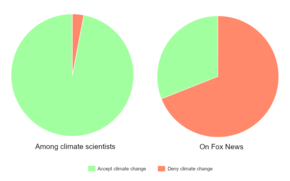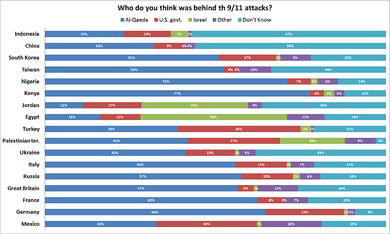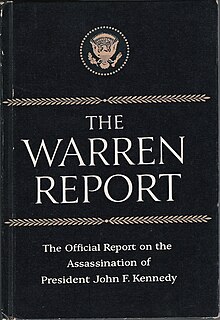Conspiracy theory
[22][23] Psychologists usually attribute belief in conspiracy theories to a number of psychopathological conditions such as paranoia, schizotypy, narcissism, and insecure attachment,[9] or to a form of cognitive bias called "illusory pattern perception".[12][28][29][30][31] They are often strongly believed by the perpetrators of terrorist attacks, and were used as justification by Timothy McVeigh and Anders Breivik, as well as by governments such as Nazi Germany, the Soviet Union,[28] and Turkey.But our masses, having only a rough general knowledge of foreign affairs, and not unnaturally somewhat exaggerating the space which we occupy in the world's eye, do not appreciate the complications which rendered such a conspiracy impossible.[61] Whether the CIA was responsible for popularising the term "conspiracy theory" was analyzed by Michael Butter, a Professor of American Literary and Cultural History at the University of Tübingen.More grandiose conspiracy theories portray the conspirators as being Evil Incarnate: of having caused all the ills from which we suffer, committing abominable acts of unthinkable cruelty on a routine basis, and striving ultimately to subvert or destroy everything we hold dear.[49][65] Conspiracy theories once limited to fringe audiences have become commonplace in mass media, contributing to conspiracism emerging as a cultural phenomenon in the United States of the late 20th and early 21st centuries.Conspiratorial thinking is correlated with antigovernmental orientations and a low sense of political efficacy, with conspiracy believers perceiving a governmental threat to individual rights and displaying a deep skepticism that who one votes for really matters.If they successfully find a platform to present their views in a debate format, they focus on using rhetorical ad hominems and attacking perceived flaws in the mainstream account, while avoiding any discussion of the shortcomings in their own position.Specifically, it was claimed that part of the procedure reflected a conspiracy to silence dissenters, which served as motivation for opponents of the report and successfully redirected a significant amount of the public discussion away from the science.[28][29] They are often strongly believed by the perpetrators of terrorist attacks, and were used as justification by Timothy McVeigh, Anders Breivik and Brenton Tarrant, as well as by governments such as Nazi Germany and the Soviet Union.[49] Characteristics of successful strategies for reaching conspiracy theorists have been divided into several broad categories: 1) Arguments can be presented by "trusted messengers", such as people who were formerly members of an extremist group.[51] Researchers Carlos Diaz Ruiz and Tomas Nilsson have proposed technical and rhetorical interventions to counter the spread of conspiracy theories on social media.However, excessively appealing to catastrophic scenarios (e.g. low vaccination rates causing an epidemic) may provoke anxiety, which is associated with conspiracism and could increase belief in conspiracy theories instead.[9] Another approach is based on viewing conspiracy theories as narratives which express personal and cultural values, making them less susceptible to straightforward factual corrections, and more effectively addressed by counter-narratives.For example, since conspiracy theories can reinterpret disconfirming information as part of their narrative, refuting a claim can result in accidentally reinforcing it,[63][106] which is referred to as a "backfire effect".[94] In this context, possible interventions include carefully selecting which conspiracy theories to refute, requesting additional analyses from independent observers, and introducing cognitive diversity into conspiratorial communities by undermining their poor epistemology.[42][106] For example, while conspiratorial beliefs can result from a perceived sense of powerlessness, exposure to conspiracy theories immediately suppresses personal feelings of autonomy and control.[122] The political scientist Michael Barkun, discussing the usage of "conspiracy theory" in contemporary American culture, holds that this term is used for a belief that explains an event as the result of a secret plot by exceptionally powerful and cunning conspirators to achieve a malevolent end.[123][124] According to Barkun, the appeal of conspiracism is threefold: This third point is supported by research of Roland Imhoff, professor of social psychology at the Johannes Gutenberg University Mainz.[127][128][129][130][131][132] According to Berlet and Lyons, "Conspiracism is a particular narrative form of scapegoating that frames demonized enemies as part of a vast insidious plot against the common good, while it valorizes the scapegoater as a hero for sounding the alarm"."[132] Sociological historian Holger Herwig found in studying German explanations for the origins of World War I, "Those events that are most important are hardest to understand because they attract the greatest attention from myth makers and charlatans.It also assumes that the alleged conspirators are so competent that they can fool the entire world, but so incompetent that even the unskilled conspiracy theorists can find mistakes they make that prove the fraud.[158][159] The philosopher Karl Popper described the central problem of conspiracy theories as a form of fundamental attribution error, where every event is generally perceived as being intentional and planned, greatly underestimating the effects of randomness and unintended consequences.[161] Popper argued that totalitarianism was founded on conspiracy theories which drew on imaginary plots which were driven by paranoid scenarios predicated on tribalism, chauvinism, or racism.[169] Osama bin Laden and Ayman al-Zawahiri used conspiracy theories about the United States to gain support for al-Qaeda in the Arab world, and as rhetoric to distinguish themselves from similar groups, although they may not have believed the conspiratorial claims themselves.[171] This is explained by a desire to "make up for our lost Ottoman grandeur",[171] the humiliation of perceiving Turkey as part of "the malfunctioning half" of the world,[172] and a "low level of media literacy among the Turkish population.[180][181] Theologian Robert Jewett and philosopher John Shelton Lawrence attribute the enduring popularity of conspiracy theories in the U.S. to the Cold War, McCarthyism, and counterculture rejection of authority.They state that among both the left-wing and right-wing, there remains a willingness to use real events, such as Soviet plots, inconsistencies in the Warren Report, and the 9/11 attacks, to support the existence of unverified and ongoing large-scale conspiracies.Unlike Robert Jewett, Rogin blamed not the counterculture, but America's dominant culture of liberal individualism and the fears it stimulated to explain the periodic eruption of irrational conspiracy theories.[183] The Watergate scandal has also been used to bestow legitimacy to other conspiracy theories, with Richard Nixon himself commenting that it served as a "Rorschach ink blot" which invited others to fill in the underlying pattern.



Conspiracy theory (disambiguation)Eye of ProvidenceFounding Fathers of the United StatesIlluminaticonspiracyconnotationscientistshistoriansfalsificationcircular reasoningStephan Lewandowskycynicismpsychological projectionparanoiaMachiavellianismschizotypynarcissisminsecure attachmentcognitive biasillusory pattern perceptionDark triadempathycognitive scientistsprejudicepropagandawitch huntsgenocidesterrorist attacksTimothy McVeighAnders BreivikNazi GermanySoviet UnionTurkeyAIDS denialismSouth Africadenialism2020 United States presidential electionJanuary 6 United States Capitol attackconspiracy theories about genetically modified foodsZambiafaminehungerpublic healthvaccinationwater fluoridationvaccine-preventable diseasesscientific evidenceextremisteconomymass mediaInternetsocial mediacultural phenomenonopen societyanalytical thinkingOxford English DictionaryThe American Historical ReviewCharles Astor BristedThe New York Timesweakening the United States during the American Civil WardissentingGeorge MonbiottheoriesThe Warren ReportWarren Commissionassassination of John F. KennedyUniversity of TübingenLee Harvey OswaldMichael BarkunbureaucraciesList of conspiracy theoriesfalse flag1969 Apollo Moon landings9/11 terrorist attacksrise of Hitler1997 Asian financial crisisclimate changeRothschild familyChina's currency policychemtrail conspiracy theoryfolkloreYouTubesearch engineborn in Kenya, instead of Hawaii where he was actually bornMike HuckabeeRepublicancrisis actorBarack ObamabirtherismMoon landing conspiracy theories9/11 conspiracy theoriesRussell MuirheadNancy RosenblumJesse WalkerKennedy assassinationspread of AIDSFreemasonsCommunismCatholic ChurchDavid IckeMilton William CooperMurray RothbardCui bonoNoam Chomskyinstitutional analysismainstream mediaconjunction fallacyKing's College LondonWatergate scandalinvestigative journalismhistorical analysiscognitive biasesproportionality biasattribution biasconfirmation biasappeal to emotionmust be a conspiracyeyewitness testimonyfalsifiedfallacious argumentsFox Newsfalse balanceTeach the Controversyintelligent designad hominemsscientific theory
